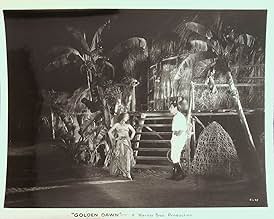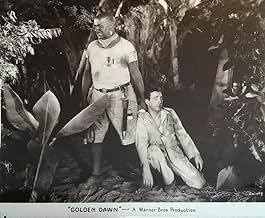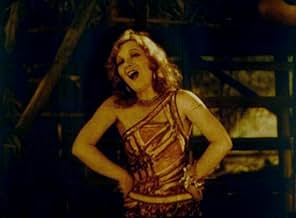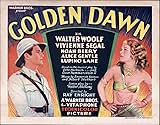"Golden Dawn" is a musical operetta released by Warner Brothers, photographed entirely in Technicolor, and starring Walter Woolf King and Noah Beery. The film is based on the semi-hit stage ... Read all"Golden Dawn" is a musical operetta released by Warner Brothers, photographed entirely in Technicolor, and starring Walter Woolf King and Noah Beery. The film is based on the semi-hit stage musical of the same name by Oscar Hammerstein II and Otto Harbach."Golden Dawn" is a musical operetta released by Warner Brothers, photographed entirely in Technicolor, and starring Walter Woolf King and Noah Beery. The film is based on the semi-hit stage musical of the same name by Oscar Hammerstein II and Otto Harbach.
- Director
- Writers
- Stars
Walter Woolf King
- Tom Allen
- (as Walter Woolf)
Sôjin Kamiyama
- Piper
- (as Sojin)
Eduardo Cansino
- Secondary Supporting Role
- (uncredited)
Nigel De Brulier
- Hasmali - the Witch Doctor
- (uncredited)
Nick De Ruiz
- Napoli
- (uncredited)
Frank Dunn
- Secondary Supporting Role
- (uncredited)
Ivan F. Simpson
- Secondary Supporting Role
- (uncredited)
- Director
- Writers
- All cast & crew
- Production, box office & more at IMDbPro
Featured reviews
The reviews of this one simply compelled me to give it a try; I wasn't disappointed. I love films made at the dawn of sound, and in this case also the dawn of taste, apart from often being entertaining they usually tell me a lot about who we were and who we now are. All white people back then apparently considered they were innately superior to all other races, nowadays gifted with movie-hindsight all races can all afford to be retrospectively superior to everyone in the primitive past, and in both cases, innocently. Where we will end up though is another matter – it even tells me something that the original New York stage play ran to 184 performances in 1927, and that this film in black and white (if you "know black from white") has actually survived Time when much worthier films were left to rot.
Dawn is a white native goddess with a hazy past, white Britisher Tom Allen loves her purely but jet blacked-up native Shep Keyes lusts after her. It was still clunky old Noah Beery for all the make-up though – I just had to laugh at the blackened armpits of his shirt. He's worth watching singing to his whip too. The first song is shrilled out by a blackface Margaret Dumont lookalike – I looked out in vain for Captain Spaulding. Vivienne Segal and Walter Woolf King (pre-Marx's Lasspari) are excellent in their lead roles with every word and every lyric perfectly enunciated, every emotion delivered complete with Capital Letters. I loved Woolf's line at one point about not letting Segal sacrifice herself and "go through with this savage religious stupidity" – out of the mouths of babes! The songs, even when the lyrics make you sit up are in the main dull as ditchwater except for We Two (I was wishing for Eddie Cantor though) and the energetic A Tiger (the routine later bettered in King Of Jazz's Ragamuffin Romeo).
It's exhilaratingly barmy doing Vienna in the jungle, but it must have played pretty old-fashioned and pointless even in 1930. So if you decide to hunt this down as it's probably banned from TV and watch it, keep it in the strict amber of context and you will have a unique experience no matter what your colour or prejudices. Unfortunately I can't say the same for Blazing Saddles (my personal bête noire) which was not innocent but malicious.
Dawn is a white native goddess with a hazy past, white Britisher Tom Allen loves her purely but jet blacked-up native Shep Keyes lusts after her. It was still clunky old Noah Beery for all the make-up though – I just had to laugh at the blackened armpits of his shirt. He's worth watching singing to his whip too. The first song is shrilled out by a blackface Margaret Dumont lookalike – I looked out in vain for Captain Spaulding. Vivienne Segal and Walter Woolf King (pre-Marx's Lasspari) are excellent in their lead roles with every word and every lyric perfectly enunciated, every emotion delivered complete with Capital Letters. I loved Woolf's line at one point about not letting Segal sacrifice herself and "go through with this savage religious stupidity" – out of the mouths of babes! The songs, even when the lyrics make you sit up are in the main dull as ditchwater except for We Two (I was wishing for Eddie Cantor though) and the energetic A Tiger (the routine later bettered in King Of Jazz's Ragamuffin Romeo).
It's exhilaratingly barmy doing Vienna in the jungle, but it must have played pretty old-fashioned and pointless even in 1930. So if you decide to hunt this down as it's probably banned from TV and watch it, keep it in the strict amber of context and you will have a unique experience no matter what your colour or prejudices. Unfortunately I can't say the same for Blazing Saddles (my personal bête noire) which was not innocent but malicious.
I guess the novelty of sound was what got this quickie musical produced. It had a rather unsuccessful run on stage and here we see why. Noah Beery in awful blackface that stains his clothes singing a song about his whip and how it makes him the Boss man. His accent, while supposedly an African native is pure Black Southern "You-all" and "we'all". The "natives" are painted in random patterns, looking like skeleton men extras from the "Danger Island" series that used to play along with the "Banana Splits" on Saturday mornings. The music is okay, the lyrics atrocious. Lovely and talented Vivienne Segal sings a love song about "My Bwana", Alice Gentle sings the opening solo, which is basically telling the Africans how great the White men are and to obey them. Lupino Lane the comedian will remind many of Stan Laurel in his speech. I made it through the whole thing, call me a masochist. It does show that just because it is old and Black & White, doesn't always mean it is a "classic".
I love this film. The music is perfect. Alice Gentle has a gorgeous voice. Her rendition of "Africa Smiles No More" is lovely. I could listen to her singing for hours. It is such a shame that she only was only featured in two feature films and the other ("Song of the Flame" 1930) is now unfortunately lost. The only other extant film is a Technicolor Vitaphone short entitled "A Scene from Carmen" (1929) which features her singing but is not readily available.
The songs which were written by Otto A. Harbach & Oscar Hammerstein II are superb. I especially love the song "Dawn" as sung by Walter Woolf King who has a delightful baritone voice.
Noah Beery is great as the villain and his bass voice is amazing. Vivienne Segal has the least impressive voice of the cast but is still pleasing.
"In a Jungle Bungalow" sung by Lupino Lane and chorus is another pleasing song.
Some of the reviewers on here are clearly clueless. There is nothing racist about this film. As a matter of fact, the film was banned from many Southern states because it was the exact opposite. Racist audiences were offended by a white man (Walter Woolf King) falling in love with a woman (Vivienne Segal) who had a black mother (Alice Gentle). If you examine the period film trade publications made available by the Media History on the Internet Archive you can verify this fact.
Calling Noah Beery racist for portraying a black man is as absurd as calling Lon Chaney's portrayal of a Chinese man racist in the 1927 picture "Mister Wu." Anyone who knows anything about this period in film history knows that Noah Beery was typecast by Warner Bros. as the studio villain and he played pretty much the same character in all his early talking pictures. For example, in "Bright Lights" (1931) he portrays a villain who is supposed to be Portuguese while in "Oh Sailor Behave" (1930) he portrays a villain who is supposed to be Romanian while in "Song of the Flame" (1930) he was a Russian villain. Are these portrayals likewise racist since he plays for laughs and acts in a stereotypical manner? Absurd.
The songs which were written by Otto A. Harbach & Oscar Hammerstein II are superb. I especially love the song "Dawn" as sung by Walter Woolf King who has a delightful baritone voice.
Noah Beery is great as the villain and his bass voice is amazing. Vivienne Segal has the least impressive voice of the cast but is still pleasing.
"In a Jungle Bungalow" sung by Lupino Lane and chorus is another pleasing song.
Some of the reviewers on here are clearly clueless. There is nothing racist about this film. As a matter of fact, the film was banned from many Southern states because it was the exact opposite. Racist audiences were offended by a white man (Walter Woolf King) falling in love with a woman (Vivienne Segal) who had a black mother (Alice Gentle). If you examine the period film trade publications made available by the Media History on the Internet Archive you can verify this fact.
Calling Noah Beery racist for portraying a black man is as absurd as calling Lon Chaney's portrayal of a Chinese man racist in the 1927 picture "Mister Wu." Anyone who knows anything about this period in film history knows that Noah Beery was typecast by Warner Bros. as the studio villain and he played pretty much the same character in all his early talking pictures. For example, in "Bright Lights" (1931) he portrays a villain who is supposed to be Portuguese while in "Oh Sailor Behave" (1930) he portrays a villain who is supposed to be Romanian while in "Song of the Flame" (1930) he was a Russian villain. Are these portrayals likewise racist since he plays for laughs and acts in a stereotypical manner? Absurd.
...What a grand time they would have sending up this putrid songfest, based on a stage musical that wasn't very successful to begin with. One of the last of the first wave of movie musicals, and surely one of the worst: a preposterous operetta about a light-skinned African princess and the white soldier who loves her. (It turns out she's white, too, so it's okey-doke. I'm not spoiling anything.) Howlingly racist even for its day, what with the united forces of the noble Old World benevolently keeping the peace among the "heathens" of Boer-controlled Africa. (Can this be the same Oscar Hammerstein who wrote "Show Boat" more or less concurrently?) Ineptly shot, paced, and acted, with a number of white actors in blackface, including an unforgivable Noah Beery, his dusky makeup slowly melting under the hot lights.
All that said, it's a rare chance to see the great stage star Vivienne Segal in a lead, and the famous British comic Lupino Lane do a fun eccentric dance. The Kalman score is quite pretty, too, if you can tune out the lyrics. But unless you're a connoisseur of operetta or a lover of grotesquely bad movies, the whole thing is just about unwatchable.
All that said, it's a rare chance to see the great stage star Vivienne Segal in a lead, and the famous British comic Lupino Lane do a fun eccentric dance. The Kalman score is quite pretty, too, if you can tune out the lyrics. But unless you're a connoisseur of operetta or a lover of grotesquely bad movies, the whole thing is just about unwatchable.
I recently saw a book on bizarre movies featuring cheap space monsters, Bad Biker Boys, and Bad Babes in Bikinis. That's not bizarre, that's boring! Now Golden Dawn, here's a bizarre movie for you! Prisoners of war in the middle of the African jungle with the natives wanting to do a human sacrifice...and in the middle of it all we have Lupino Lane (bless his soul) doing a happy go-lucky jig. Unlike most cult films, this had a budget, and was expected to be taken as serious film making when it came out.
Believe me, I can see why people would give this a low rating. But if you're into saying "Huh?" and wondering what people were thinking when they were creating something...this is for you.
Believe me, I can see why people would give this a low rating. But if you're into saying "Huh?" and wondering what people were thinking when they were creating something...this is for you.
Did you know
- TriviaThe Technicolor version is apparently lost; only the black and white version survives.
- GoofsComposer Herbert Stothart is billed as "Hubert" in the opening credits.
- SoundtracksAfrica Smiles No More
(1930) (uncredited)
Music by Harry Akst
Lyrics by Grant Clarke
Sung by Alice Gentle
Details
- Runtime
- 1h 21m(81 min)
- Color
- Color(2-strip Technicolor, original print)
Contribute to this page
Suggest an edit or add missing content






















